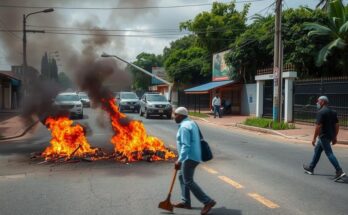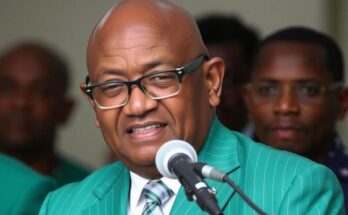On October 6, 2024, Tunisia held presidential elections, marked by a low turnout of 27.7%. Incumbent President Kais Saied faced opposition from Zouhair Maghzaoui, while Ayachi Zammel was imprisoned before the election. Many voters expressed civic duty despite widespread apathy, as others boycotted the election, deeming it undemocratic amidst Saied’s consolidation of power. The results remain pending, reflecting a tumultuous political landscape.
Tunisia recently held its presidential elections amidst a climate of political tension, marked by voter apathy and the imprisonment of one of President Kais Saied’s principal challengers. The elections, conducted on October 6, 2024, displayed a disheartening turnout of merely 27.7% of the electorate, highlighting the public’s disillusionment with the electoral process. The candidates included President Saied, who is seeking re-election, alongside Zouhair Maghzaoui, a leftist politician. Ayachi Zammel, a businessman who was also a contender, found himself imprisoned prior to the elections, accused of electoral misconduct. Despite the low turnout, some citizens expressed a sense of civic duty, believing that participation in the election was imperative for the future of Tunisia. Khaled Lamsi, a taxi driver, noted, “I want the new president who will be elected to do good things for our country and for our children, and their future, and our lives,” emphasizing the necessity of electoral engagement. Conversely, the opposition largely boycotted the election, denouncing it as a farce driven by authoritarian tendencies. In this context, President Saied, a former law professor, has adopted emergency powers during his tenure, further consolidating presidential authority at the expense of parliament and civil liberties. The political atmosphere leading up to the election has been fraught with intimidation and a lack of genuine competition, casting doubt on the legitimacy of the electoral process.
Since the Arab Spring, Tunisia has undergone significant political changes, initially seen as a beacon of hope for democracy in the region. However, President Kais Saied’s administration has increasingly garnered criticism for authoritarian practices, leading to a stunted political landscape characterized by the imprisonment of opposition figures and restricted electoral competition. Saied’s efforts to reconfigure the power structure in Tunisia have been met with both support and resistance, with many citizens caught between a desire for stability and the call for democratic reform.
The Tunisian presidential elections have underscored the pressing issues of political freedom and public engagement. With a mere 27.7% voter turnout and significant opposition absent from the race, the credibility of the electoral process remains in question. President Kais Saied’s regime continues to face scrutiny for its authoritarian measures, which threaten the democratic aspirations of the Tunisian people. As the nation reflects on the election results, the path forward will hinge on addressing the underlying challenges to political participation and governance.
Original Source: apnews.com




